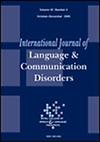Creating opportunities to communicate and connect in a global pandemic: Exploring the experiences of people with aphasia of an online conversation partner scheme
Abstract
Background
Conversation partner schemes for people with aphasia (PWA) can promote communication and quality of life as well as support skill development for students. Initial evidence indicates online conversation partner formats are acceptable as an alternative to in-person delivery.
Aims
To evaluate the experiences of PWA of an online conversation partner scheme during the global pandemic.
Methods & Procedures
This qualitative study captured the experiences of eight PWA through semi-structured interviews. Reflexive thematic analysis was used to analyse the data and to create themes and subthemes, reflecting the experiences of the participants through the interpretation of the researchers.
Outcomes & Results
Two main themes were generated, each with subthemes. The first theme was Communicating and connecting online: ‘It was brilliant’ with subthemes: ‘It help me and I help them’: Mutual benefits, ‘Straight away I managed to speak’: Supported conversations, ‘We got to know each other’: Connecting, and ‘Nine out of ten, easy’: Convenient and easy. The second theme was Being me online: lacks ‘Je ne sais quoi’ with subthemes: ‘I like to shake hands’: Missing a human connection, ‘Show me, me self, myself, my broad Yorkshire coming out’: Restricted self-expression, and ‘Wetherspoons, Wetherspoons’: Loss of the physical environment.
Conclusions & Implications
This study supports the existing evidence that online conversation partner schemes for PWA are successful. It contributes original ideas relating to the acceptability of technology, interaction and self-expression online for PWA, and considers the benefits of combining both online and face-to-face communication and connection opportunities.
WHAT THIS PAPER ADDS
What is already known on the subject
- University conversation partner schemes have been shown to improve the communication skills and confidence of PWA and students. A small body of research has shown that online conversation partner schemes are feasible and can be a positive experience for some, but not all, PWA.
What this paper adds to the existing knowledge
- Participants found that an online conversation partner scheme during the COVID-19 pandemic gave them the opportunity to communicate and connect with students, and led to mutual benefits including enjoyment, improved communication skills, confidence and a sense of purpose. They were able to connect through supported conversations and found it convenient and easy to meet online. Despite these benefits, the participants felt that there was something missing in terms of the human connection, self-expression and the physical environment.
What are the potential or actual clinical implications of this work?
- This study suggests that online conversation partner schemes provide an opportunity for those who are restricted in their ability to meet face to face or would prefer the ease and comfort of staying in their own home. However, some people may face more barriers in meeting online due to limited experience, skills or support with technology, and may find it more difficult to communicate, build a connection and express themselves. Either using a combined approach of online and face-to-face interactions or providing a choice for PWA will ensure that they are still able to access the psychosocial benefits of participating in a conversation partner scheme.


 求助内容:
求助内容: 应助结果提醒方式:
应助结果提醒方式:


